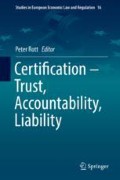Abstract
Certification means the confirmation of compliance with a pre-defined standard relating to a business, a product, a service or a management system. That standard can be a public law standard, a private standard or a hybrid. Certification is a popular instrument of private governance of public goods, promising greater effectiveness than control by public authorities while at the same time taking the burden away from the State and its budget. Recent scandals, for example on the certification of breast implants or on overly optimistic credit rating have cast doubts on its reliability though. The book at hand unfolds the merits and perils of certification, employing the perspectives of different disciplines and using examples from different areas of life and law.
Access this chapter
Tax calculation will be finalised at checkout
Purchases are for personal use only
Notes
- 1.
For detailed account, see chapter 3 by VI Daskalova and MA Heldeweg. See also Schepel (2005), p. 3 ff.
- 2.
CJEU, 12/7/2012, Case C-171/11, Fra.bo SpA v Deutsche Vereinigung des Gas- und Wasserfaches eV (DVGW) — Technisch-Wissenschaftlicher Verein, ECLI:EU:C:2012:453.
- 3.
CJEU. 27/10/2016, Case C-613/14 James Elliott Construction Limited v Irish Asphalt Limited, ECLI:EU:C:2016:821.
- 4.
- 5.
CJEU, 16/2/2017, Case C-219/15 Elisabeth Schmitt v TÜV Rheinland LGA Products GmbH, ECLI:EU:C:2017:128. See chapter 9 by P Rott and the references therein.
- 6.
See chapter 11 by A Halfmeier and the references therein.
- 7.
References
Blind, K., Jungmittag, A., & Mangelsdorf, A. (2011). Der gesamtwirtschaftliche Nutzen der Normung. DIN.
Colombo, C., & Eliantonio, M. (2017). Harmonized technical standards as part of EU law: Juridification with a number of unresolved legitimacy concerns? Case C-613/14 James Elliot Construction Limited v. Irish Asphalt Limited, EU:C:2016:821. Maastricht Journal of European and Comparative Law, 24, 332.
DIN. (2000). Gesamtwirtschaftlicher Nutzen der Normung - Unternehmerischer Nutzen. DIN.
Purnhagen, K. (2017). Voluntary “New Approach” technical standards are subject to judicial scrutiny by the CJEU! – The remarkable CJEU judgment “Elliott” on private standards. European Journal of Risk Regulation, 8, 586.
Schepel, H. (2005). The constitution of private governance – Product standards in the regulation of integrating markets. Oxford, England: Hart.
Schepel, H. (2013). The new approach to the new approach: The juridification of harmonized standards in EU law. Maastricht Journal of European and Comparative Law, 20, 530.
van Leeuwen, B. (2013). From status to impact, and the role of national legislation: The application of article 34 TFEU to a private certification organisation in Fra.bo. European Journal of Risk Regulation, 4, 406.
Volpato, A. (2017). The harmonized standards before the ECJ: James Elliott Construction. Common Market Law Review, 57, 597.
Author information
Authors and Affiliations
Corresponding author
Editor information
Editors and Affiliations
Rights and permissions
Copyright information
© 2019 Springer Nature Switzerland AG
About this chapter
Cite this chapter
Rott, P. (2019). Introduction. In: Rott, P. (eds) Certification – Trust, Accountability, Liability. Studies in European Economic Law and Regulation, vol 16. Springer, Cham. https://doi.org/10.1007/978-3-030-02499-4_1
Download citation
DOI: https://doi.org/10.1007/978-3-030-02499-4_1
Published:
Publisher Name: Springer, Cham
Print ISBN: 978-3-030-02498-7
Online ISBN: 978-3-030-02499-4
eBook Packages: Law and CriminologyLaw and Criminology (R0)

